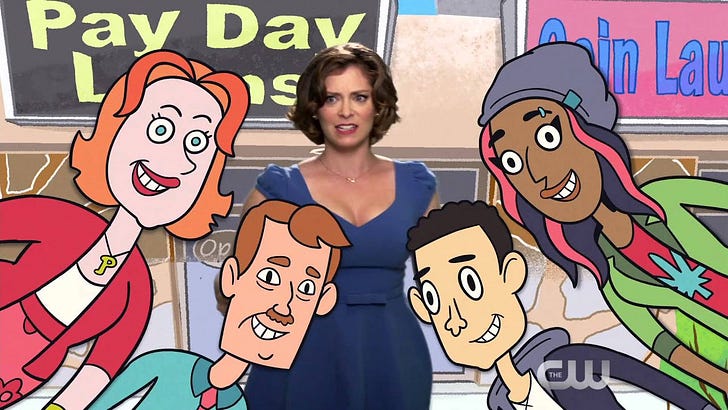There’s so much great new premium TV out there that, naturally, the only sensible thing to do is ignore all of it and instead watch something you’ve already seen from years ago. I blame the winter: we’re all hunkering down, trying to get through and searching for familiar comforts. And what could be more comforting than a musical rom-com about mental illness?
—
I still think of 2015 as ‘quite recent’, but even if you overlook all of the quite significant global and political events that have occurred since — which I’d really like to — it was also a time before we had access to Netflix, or indeed any streaming services, in our house. Which dates things somewhat, as well as confirming something that the calendar, or any sensible person, could have already told me: it was 10 years ago.
Netflix was once a DVD-by-post style service in the US: a bit like LoveFilm, which we had over here in the UK, at a time when we were perfectly happy to receive a single disc from a TV box set through the post, watch 3-4 episodes, then send it back and wait for the next one. I think my first experience of a streaming service was a friend of mine running Netflix through a Nintendo Wii so that we could watch some quite blurry and stuttering footage of an American stand-up special.
It’ll never catch on, I thought, which is what I tend to think about absolutely everything else that has caught on, right until the moment that I’m forced to become a late adopter and realise that it’s actually rather good, really.
For example, it was quite the leap from ‘posting back a DVD’ to ‘having a whole load of new shows available to you at the press of a button’, meaning you could be introduced to things that you didn’t even know you wanted to watch: a situation that eventually resulted in commonly-held feelings of indecision and paralysis while endlessly scrolling through menus, but at the time was quite a novelty.
Anyway, this is how I first came to be introduced to Crazy Ex-Girlfriend, a series about Rebecca Bunch, a high-achieving but depressed young woman who, after a chance meeting, upends her whole life to follow her ex-boyfriend from teen summer camp days, Josh Chan, across the country, on the basis that he is the only thing that can or will make her happy again.
It’s also a musical. Now here I could launch into some extremely hackneyed, Dad-style stand-up comedy material about how musicals are inherently ridiculous, because, right, they just start singing all of a sudden — what’s that about? To which I could also add that in these kinds of things, all of the characters — no matter who they are in the story — are always played by all-American theatre kids with perfect smiles, who can dance and sing in the same technically precise and slightly mechanical manner.
But none of that matters if the musical in question manages to charm you. (We’ve all seen Pitch Perfect, right?)
The first series of Crazy Ex-Girlfriend is the best. I don’t really like it when people say that, just as I don’t really like it when people say they stopped watching a show they’d previously enjoyed because of a perceived dip in quality, or when they say that a particular show doesn’t ‘get good’ until midway through the second or third series, and recommend you just skip to that point.1 But in this case, I still think it’s true.
I won’t pretend to fully understand the vagaries of US TV commissioning processes, but I do get the feeling that, for a long time, shows were written to be commercially successful in the first instance, and if that goal was achieved, the brief was to keep the plates spinning for as long as possible. You start with an idea of how something will start, but not how it will finish, and no-one wants you to get to that finish while people are still watching.
But if they stop, then you’re going to have to wrap it up quickly, if you even get the opportunity at all. And that’s before you get into the nuts and bolts of actor availability, happiness and contract negotiations.2
I think this can create an atmosphere where debut series are infused with a kind of weird, frenetic energy and excitement that can’t ever quite be repeated or captured again.3 And the first series of Crazy Ex-Girlfriend is kind of all over the place, in a good way. As Rebecca smashes into everyone’s lives, making poor choices and trying to cover them up, and somehow getting away with things more than she should, it’s a tightrope walk of awkward moments, missed opportunities and brief not-quite-epiphanies, all infused with plenty of knowing humour, in a way that somehow makes you root for her, even though she definitely is the crazy ex-girlfriend of the show’s title.
And the songs are really good. The musical director for the series was Adam Schlesinger4 of indie popsters Fountains of Wayne, and the tunes walk a delicate line between sincerity and humour with precision and skill. Each time a song seems to be getting a bit too earnest and serious, there’s a zinger to lighten thing up; if things ever feel like they’re getting a bit silly, there’s a line that really cuts to the core of what’s going on with that particular character.
All fans will have their own favourites: for what it’s worth, for me nothing quite sums up the balance described above as What’ll It Be?, a thanksgiving ballad sung by Santino Fontana’s Greg, the nice guy bartender longing to escape the place that Rebecca has chosen to come to.
In fact, it’s one reason that he comes to be suspicious of her, because no-one would willingly move to West Covina, California, without an ulterior motive: ‘Everyone’s going home, ‘cause it’s time to give thanks; Thanks for the chain stores and outlets and banks; Thanks for this town, three short hours from the beach; Where all of your dreams can stay just out of reach.’
Oof.5
Rachel Bloom as Rebecca has plenty of brilliant songs and moments also, and obviously has to do a lot of the heavy lifting throughout, but I like the way that secondary and supporting characters are all given the chance to shine: I have a particular soft spot for Daryl Whitefeather, Rebecca’s sweet-natured boss (played by Pete Gardner), who has a couple of great incidental tunes, including a brief but ludicrous EDM banger about preparing snacks for guests called Having a Few People Over that’s occasionally invoked in our household.
Without giving too much away, the show is about what it’s about, until it isn’t. Series creators Bloom and Aline Brosh McKenna declared that their aim was to unpick various rom-com archetypes and develop the characters beneath. Frankly, it couldn’t have gone on for much longer without doing so, and it achieves these goals with some success in Series 2-4, while also addressing the slightly thorny issue of its heroine’s problematic behaviour.
The introductory credits of the first series6 feature a chorus flourish stating, repeatedly, that Rebecca is a crazy ex-girlfriend. To which she eventually replies, ‘The situation’s actually a little more nuanced than that.’ And nuanced is what the series becomes: fleshing out all of the characters and attempting to avoid clichés and easy answers, while playing with the fact that, deep down, a lot of people do actually want to see those same clichés delivered by their rom-coms, no matter how knowing or clever they might be.
Crazy Ex-Girlfriend is a show that gets under your skin, in a number of different ways: it has heart, it has laughs, it has tunes, and it’s a little bit different. If you’re currently ignoring everything that everyone says you absolutely must watch because it all seems like a bit of a drag, you could do a lot worse than giving it a go.
I give it my recommendation despite the fact that, in 2025, the show is no longer available on Netflix, with the legacy of the streaming giant’s success being that dozens of competitors have subsequently popped up to acquire your favourite shows and movies from the services you currently subscribe to and place them on ones that you don’t.
And so, somehow, the only place you can currently watch Crazy Ex-Girlfriend in the UK is ITVX, the worst streaming service in existence, which interrupts a 40-minute show multiple times in order to display adverts for ITV’s seemingly endless supply of bleak British dramas about stalking, murder and domestic violence in the wrong aspect ratio.
You never had this problem with LoveFilm.
To be clear: these are perfectly legitimate positions to take, but I usually prefer to start at the beginning and watch through to the end.
My thoughts at this point always turn to Lost, which entranced and then disappointed the viewing public in the mid-late 00s, as a perfect example of what can happen under this system. Although under the circumstances, I actually think the show did a pretty good job of carving out a path to a coherent ending.
Just like the beautiful, brilliant, 27-episode long first series of The O.C. Which, frankly, I’m not ready to talk about here yet. One day, perhaps. But not yet.
Who is sadly no longer with us, having tragically died, aged 52, of COVID-related complications in 2020.
Call me ridiculous, call me sentimental, call me whatever you like: I got chills just typing those words.
Each series has a different, but great, opening number: Series 3’s You Do/You Don’t Want To Be Crazy is perhaps my favourite.




